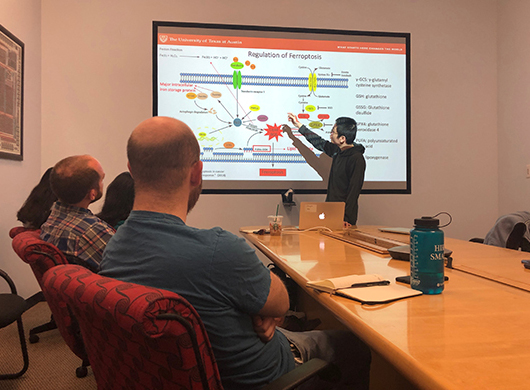Accelerating innovation in cancer research and prevention requires comprehensive planning for current operations and well as longer-term goals. With a solid foundation of research innovation and prevention serves built through 11 years of steady investment, CPRIT has positioned the state for new life science opportunities.
Planning for a Future Without Cancer
The CPRIT Oversight Committee and staff use strategic and operational planning to identify near term and future opportunities to create and expedite innovation in cancer research and breakthroughs in cancer prevention. This sets the course for CPRIT’s activities year by year and over the next decade.
The four components of CPRIT’s long-term vision for the agency and each of its three programs serve as our guide.
Decrease cancer in Texas
through prevention and translation of discoveries into treatments and cures
Focus on disparities
in cancer incidence, mortality, and access to care
Accelerate advancements
in the scientific understanding of cancer
Enhance life sciences infrastructure
in the state
Fiscal Year 2021 Program Priorities
The Oversight Committee adopted its fiscal year 2021 priorities for CPRIT’s academic research, product development research, and prevention programs at its November 20, 2019, meeting. These annual program priorities guide CPRIT’s requests for applications and the evaluation of grant proposals. In addition to priorities specific to each grant program, CPRIT’s three programs share overarching priorities that span the cancer continuum from discovery to delivery. Although the priorities serve as strategic areas of emphasis, they do not exclude funding innovative projects in areas outside of identified priorities.
Read More ...
Prevention and Early Detection Initiatives
The best way to reduce the physical, emotional, and financial burden of cancer is by preventing its occurrence and detecting it at its earliest stages. However, prevention and early detection efforts receive little funding relative to the amount devoted to curing advanced cancers.
Working together, each of CPRIT’s programs play a part in fulfilling this goal. Academic research discovers novel approaches to prevent and detect cancer early. Product development research provides new methods, diagnostics, imaging, and devices for early cancer detection. The prevention program puts these innovative approaches into practice.
Read More ...
Early Translational Research
Innovative cancer prevention efforts and treatments always start with an initial discovery. Grants from the federal government and foundations fund the basic research enabling these scientific discoveries. There is a lack of money to support the research and development activities necessary to translate initial discoveries into available therapies.
Opportunities for inter-program strategic investment by CPRIT include funding translational research that bridges the gap between basic research and product development, and between research on preventive measures and innovative technologies for early cancer detection. Funding these activities may stimulate new public-private partnerships in Texas.
Read More ...
Enhance Texas’ Research Capacity and Life Sciences Infrastructure
Texas has earned a reputation for cancer research superiority through a decade of unparalleled recruitment efforts brining cancer scientists and clinicians, at all career levels, to academic institutions in Texas. Establishing Texas as a preeminent cancer research hub attracts industry interested in developing groundbreaking treatments.
CPRIT’s investments in early-stage product development activities support the expansion of Texas’ emerging life-science industry, generating jobs and economic activity. Educating and training health care professionals boosts the state’s capacity and infrastructure for coordinated cancer prevention activities, mobilizes available resources, and accelerates system changes.
Academic Research Program Priorities
Priority in Practice - Computational Biology and Analytic Methods

Lab team @ The Center for Computational Oncology at the Oden Institute for Computational Engineering and Sciences, UT Texas Austin

Dr. Yankeelov
CPRIT is encouraging the development of the field of mathematical/computational oncology through its support for projects linking biology-based mathematical modeling with quantitative experiments that populate the key parameters in the models. By recruiting and funding investigators throughout Texas working in this area, like The University of Texas at Austin’s Dr. Thomas Yankeelov (RR160005), CPRIT is helping to establish a critical mass in this field that can then grow and become self-sustaining.
Texas is extraordinarily well-positioned to lead this change. The Oden Institute for Computational Engineering and Sciences at UT Austin is the premier institute for applied mathematics in the country. The Oden Institute recently partnered with The University of Texas M.D. Anderson and the Texas Advanced Computing Center to establish an initiative in Oncological Data and Computational Science. CPRIT’s consistent investment to recruit and support investigators in this area helped make this partnership happen.

Center for Computational Oncology team members at work
Product Development Program Priorities
Priority in Practice – Funding Disruptive Technologies
CPRIT awarded Houston-based ImmunoGenesis a $15.5 million CPRIT Texas Company Product Development Research award in 2020 to accelerate development of a novel immunotherapy drug (IMGS-001) designed to turn “cold” tumors “hot”.
Over the last decade immunotherapy drugs called checkpoint inhibitors have revolutionized therapy for many cancers, and new combination therapies continue to evolve. However, checkpoint inhibitors do not work the same in all cancers. Only a fraction of cancer patients has a partial or complete response to checkpoint inhibitors.
ImmunoGenesis' new type of immunotherapy attacks “cold” tumors - those tumors that are surrounded by immunosuppressive elements. Current checkpoint inhibitors have not been effective against these types of cancers.
CPRIT-funded preclinical work substantially increased the value of ImmunoGenesis and led to the signing of a term sheet for a large Series A financing from a venture capital firm renowned for its immuno-oncology expertise. This Series A funding, combined with the CPRIT funding, will pay for a Phase 1A/1B trial of IMGS-001 in over 90 patients, scheduled to begin in 2022.

By turning cold tumors "hot,” ImmunoGenesis seeks to unlock the potential of immunotherapy for the patients who present with cold tumors.

IMGS-001
Immunogenesis' lead program is IMGS‑001, a PD-L1/PD-L2 dual-specific inhibitor with engineered cytotoxic effector function. This means the molecule can target and kill the immunosuppressive cells in the tumor microenvironment.
Preclinical data showed that IMGS‑001 offered 5 times the response rate in cold tumors than currently available immunotherapies. Additionally, IMGS‑001 can provide a foundation for add-on therapies
Prevention Program Priorities
Priority in Practice – Geographic Areas Disproportionately Affected by Cancer

When CPRIT awarded Texas Tech University Health Sciences–Breast Center of Excellence a grant for the Access to Breast Care for West Texas (ABC4WT) project for breast cancer screening in Texas Panhandle in 2010, the region suffered the highest rate of breast cancer mortality with 15% of all breast cancers diagnosed at an advanced stage. In 2014, ABC4WT added cervical cancer screening and prevention and in 2019 expanded breast and cervical cancer screening and prevention services to include South Plains and Central West Texas regions. The renamed program ABC24WT focuses on early diagnosis for the uninsured/underinsured populations in these areas through its network of strategic public-private community partnerships.
2010
23.2
per 100,000 women
2014
18.9
per 100,000 women
2018
15.4
per 100,000 women
100%
Follow up care according to NCCN Guidelines
Cancer
High Risk Lesions

Services Provided
08/1/2010-09/01/2021
Indirect Contacts
5,647,954
Direct Contacts
39,965
Screening Mammograms
&
Diagnostic Services
10,183
Cervical Screening
&
Diagnostic Services
1,584

187
Precursors/Cancers

8,664
HPV Vaccinations

Looking Ahead
CPRIT’s $2.86 billion investment in 1,679 of the best ideas in cancer research, product development research, and prevention is building a vibrant life sciences ecosystem across the state. This groundbreaking work enhances Texas’ competitive edge in the global fight against cancer and is saving lives. From a foundation built through 11 years of steady investment, Texas can now expand into new life science opportunities. Setting the course for the next decade of work, CPRIT and its stakeholders have identified several preliminary initiatives for further development.
- Capitalize on CPRIT’s longstanding investments in improving outcomes in childhood cancer; with continued support, Texas can be the world leader in childhood cancer research
- Grow and enhance the coalitions and networks delivering cancer prevention services by providing infrastructure to support them
- Create and expand research and treatment capabilities at universities in all regions of the state
- Boost clinical trial options to more people by reducing the institutional and patient barriers to trials
- Increase the number and breadth of Collaborative Action Programs (CAPs) that target Texas-centric needs in cancer research and prevention.
- Stoke the pipeline of novel cancer diagnostic and treatment discoveries at Texas universities by supporting the transition of early-stage development in the growing number of Texas-based companies
- Double the number of NCI Designated Comprehensive Cancer Centers and elevate Texas institutions’ standing in prominent national reviews such as the US News and World Report’s rankings through continued investment in research capacity, access to cutting-edge technology, and recruiting preeminent experts and the next generation of scientific leaders to Texas
- Co-invest with established bio-tech venture capital firms in promising Texas-based companies, sharing the risks and rewards equally


